Click here to go to the individual product sheets and download them as PDFs:
(German only)
- Visuelle Kohortenanalyse
- Fehldiagnose-Reduzierung
- Zeitreihenanalyse medizinischer Daten
- Nutzergetriebene Entwicklung eines Dashboards
- Virtuelle Kohorten für den Digitalen Zwilling
- Fraunhofer-Marktmonitor »AI in Healthcare«
- Digitale Pathologie für CED
- Preisrechner Medikationskosten
- Leitlinienbasierte Entscheidungsunterstützung
- Sichere Konnektoren: Medical Data Space
- Patienten-App
Visual cohort analysis
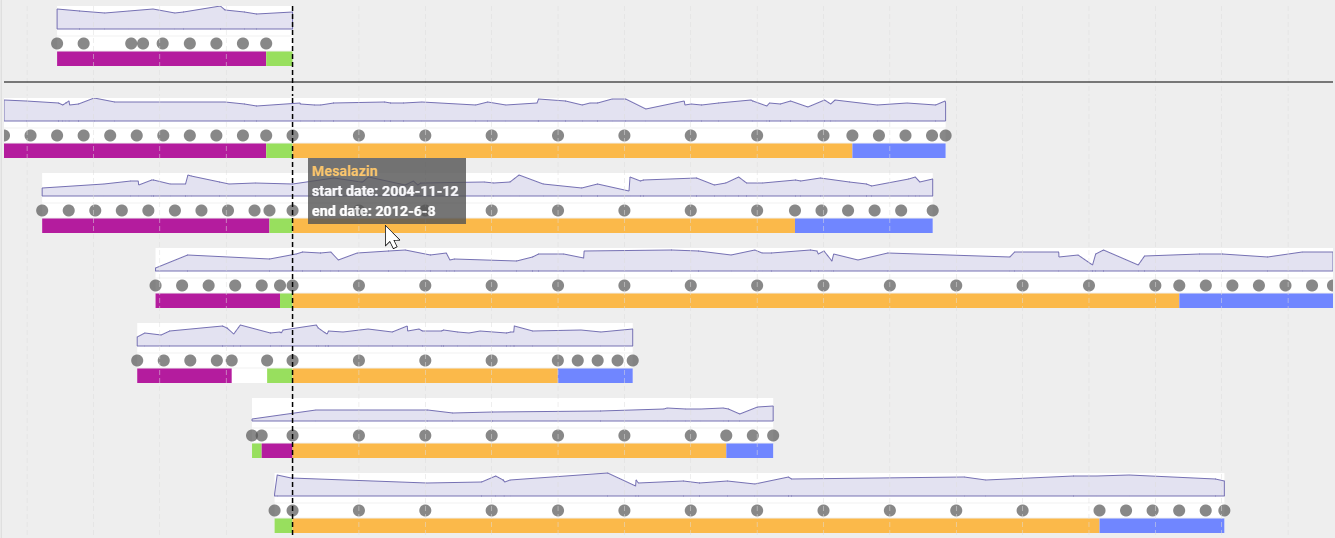
© Fraunhofer IGD
The course of chronic inflammatory bowel disease frequently extends over several decades. Physicians often have only written medical records of individual patients at their disposal. By collecting and visualizing this data, the Cohort Analysis module helps physicians gain a prompt overview of the patient him/herself and of patients with similar complaints.
Misdiagnosis Reduction
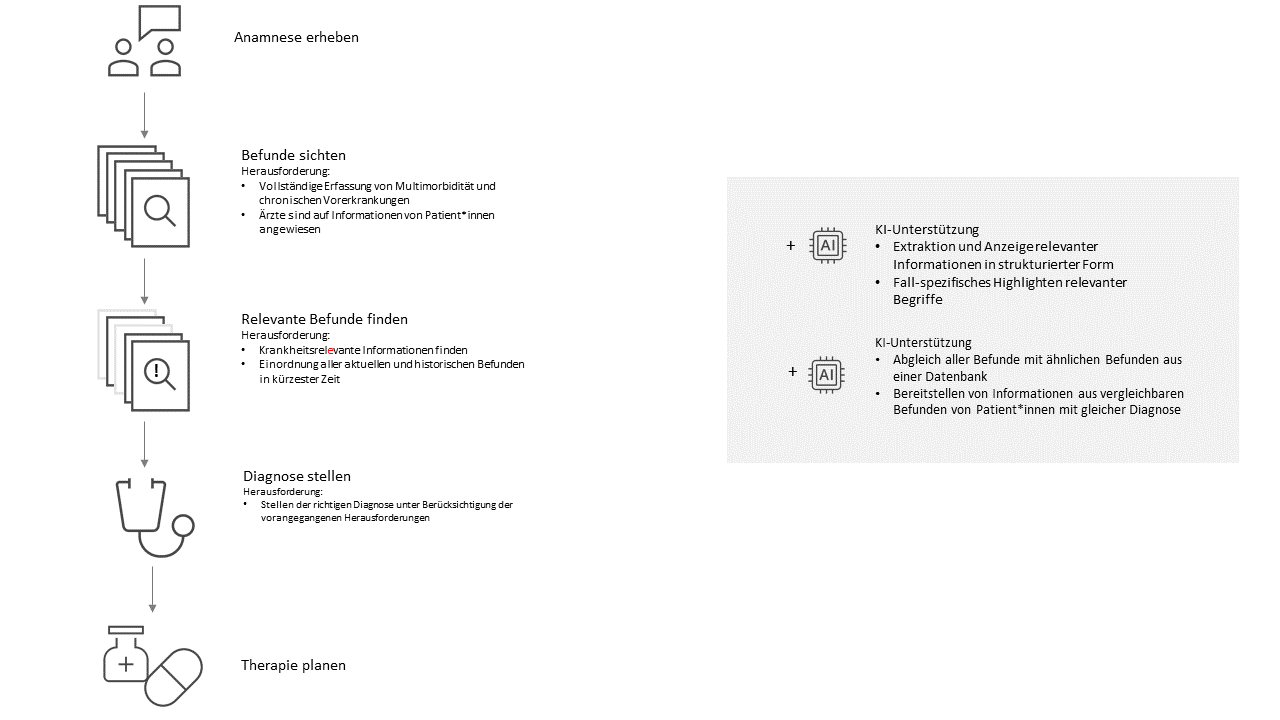
© Fraunhofer IAIS
The Intelligent Information System for Misdiagnosis Prevention module of the MED²ICIN complete solution prepares reports on patients with inflammatory bowel diseases in a structured way. In the first step, the most important terms relevant to the diagnosis are identified using text-mining methods and presented in a way that is easy to understand and interpret. In the second step, the information collected is compared with findings from other patients in order to identify cases similar to that of the patient being diagnosed.
Time series analysis of medical data
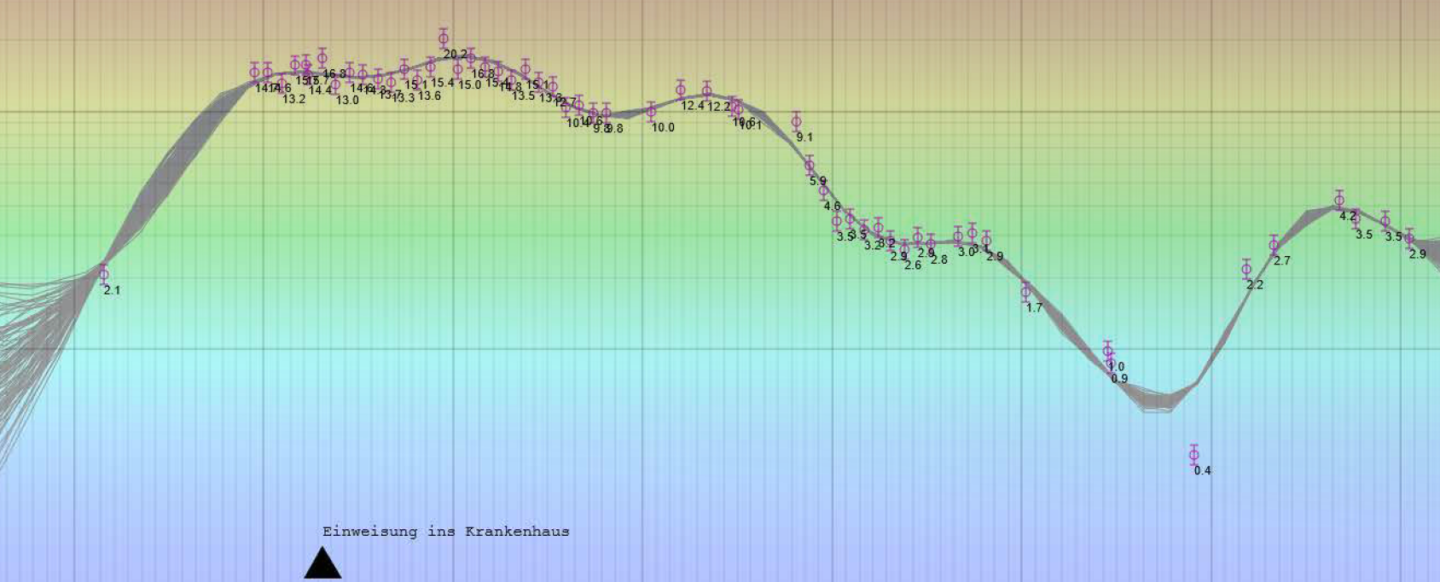
© Fraunhofer IIS
The various time courses of the measured laboratory parameters are combined by our module and processed together in a statistical model. Its essential task is to reconstruct probable disease progressions of the underlying modalities from the recorded measurement points and thus to form a model for the possible course of inflammatory bowel disease.
User-driven development of a dashboard
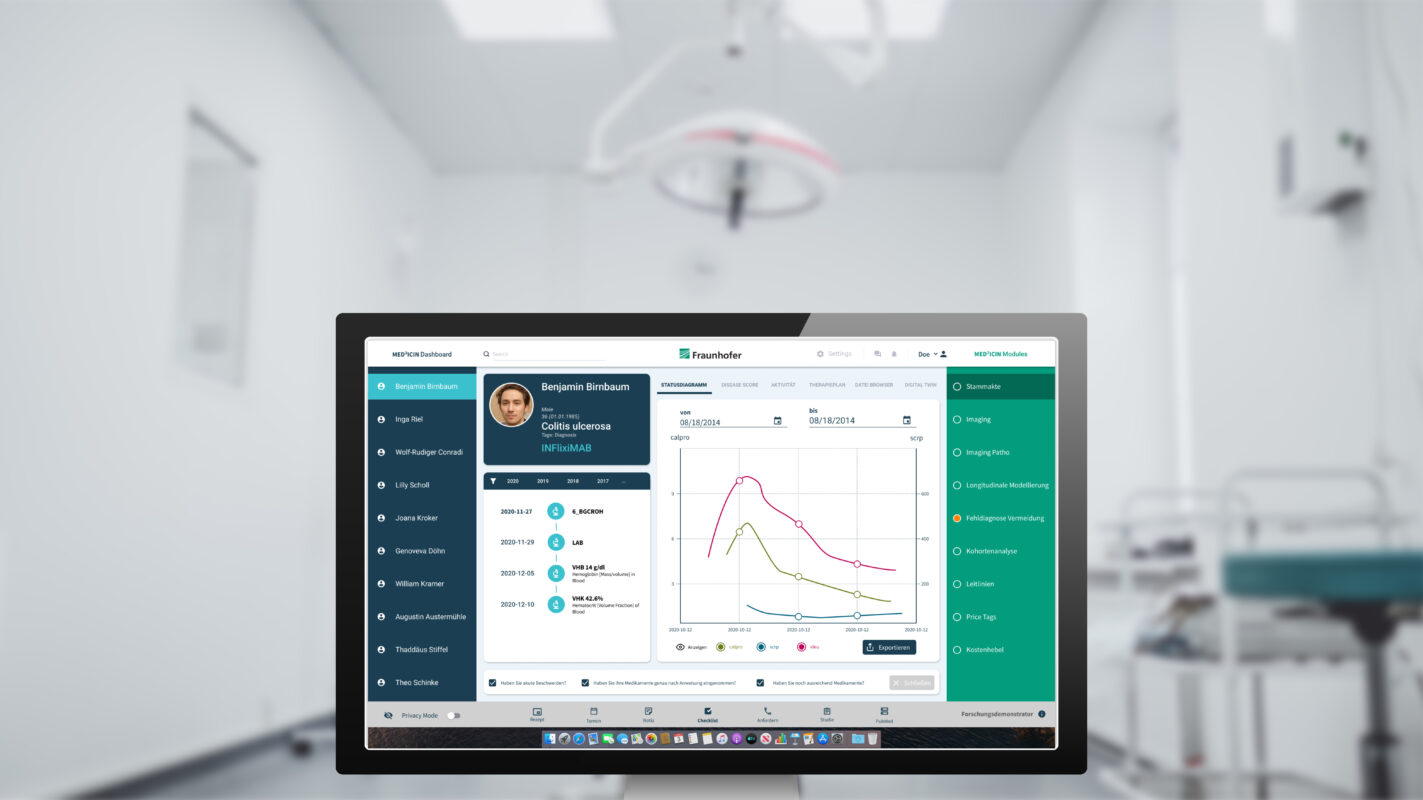
© Fraunhofer IME
In the MED²ICIN project, two use cases are being investigated – one chronic and one acute – to develop an intelligent system that provides support for medical professionals in making decisions. These recommendations are derived from data using artificial intelligence techniques, with the proviso that the decision-making process must be comprehensible to medical staff. In designing the user interface (UI), this means that it is primarily a matter of presenting relevant data in a prioritized manner appropriate to the situation, e.g. during a patient consultation or to a tumor board meeting.
Virtual Cohorts for the Digital Twin

© Fraunhofer ITMP
The use of health data in Germany is subject to a variety of ethical or legal restrictions for reasons of data protection, property rights, regulation and legislation. Access to “human data”, both of individual patients and of complete studies, therefore requires multiple approval processes, such as votes in favor by ethics committees or risk impact assessments, and the conclusion of corresponding data access or data use agreements.
Regulatory and time constraints of approval processes for data acquisition impose limitations on technological developments in medical informatics and their use, as in the case of the digital twin. Reliable and high-quality synthetic patient data could therefore constitute a solution that allows development projects to proceed on an initially provisional basis without “real data”.
Fraunhofer Market Monitor: AI in Healthcare
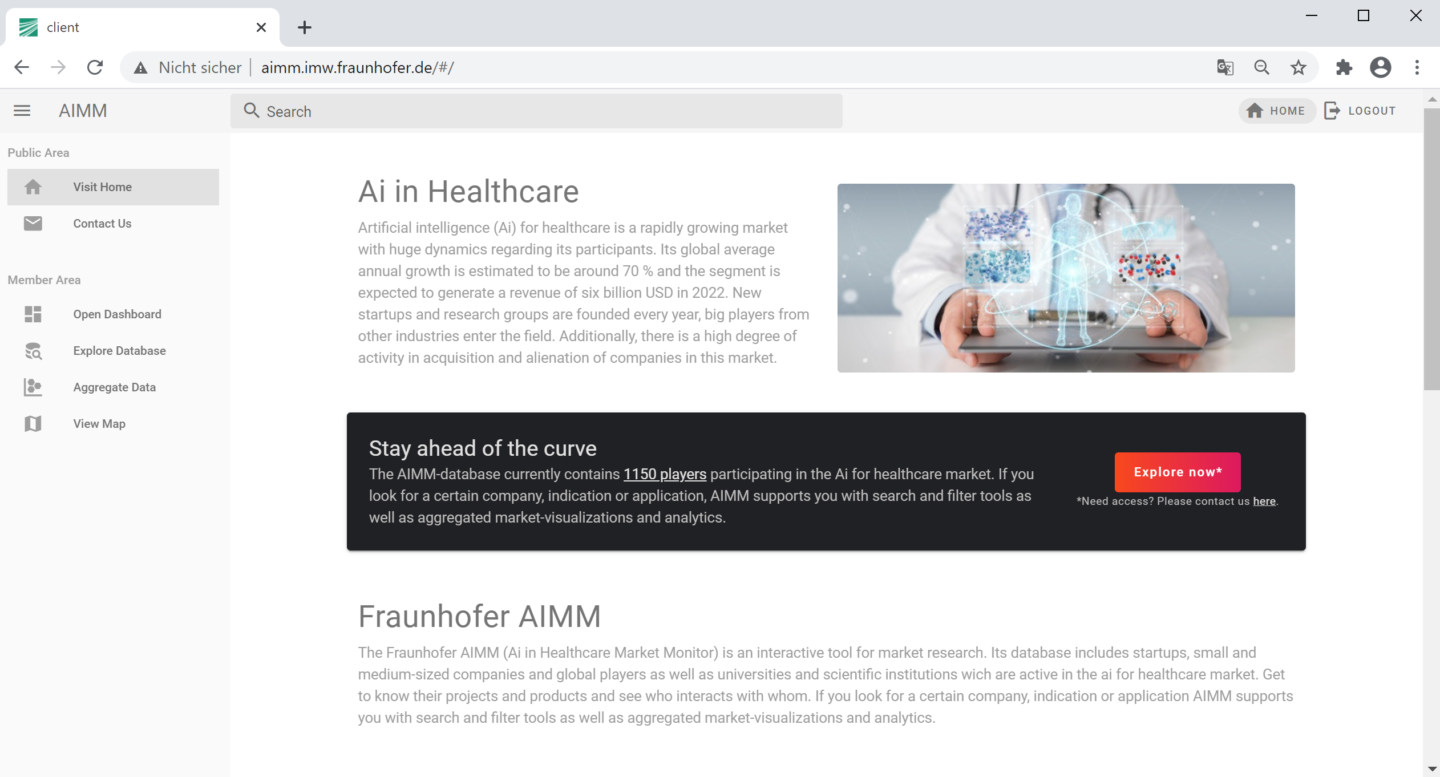
© Fraunhofer AIMM
The Fraunhofer AI in Healthcare market monitor consists of a database in which new players in the international market for AI applications in the healthcare sector are continuously documented and their details are updated at recurring intervals. The datasets of these “players” contain information on their KPIs, their business model, brief descriptions of their products, specialized medical areas, key terminology and business partnerships.
The Fraunhofer AI in Healthcare market monitor currently covers around 1,100 companies active in the healthcare market in the area of artificial intelligence (AI). They include start-ups, large international corporations, small and medium-sized enterprises, universities and research institutes.
Digital pathology for IBD

© Fraunhofer IIS
The automated analysis of intestinal tissue sections and the generation of histological scores allows a more efficient diagnosis of chronic inflammatory bowel disease in pathology. After the glass slides with the biopsies have been digitized using a tissue scanner, the resulting enlarged gigapixel images – so-called “whole-slide images” – can be analyzed using an AI-based algorithm. This algorithm localizes inflamed areas and classifies them as low, medium or high inflammation. A particular challenge is to distinguish between chronic and acute inflammation. At the same time, disturbances in the architecture of the mucosa (crypt architecture) are also detected and likewise classified (low, medium, high).
Price calculator for medication costs
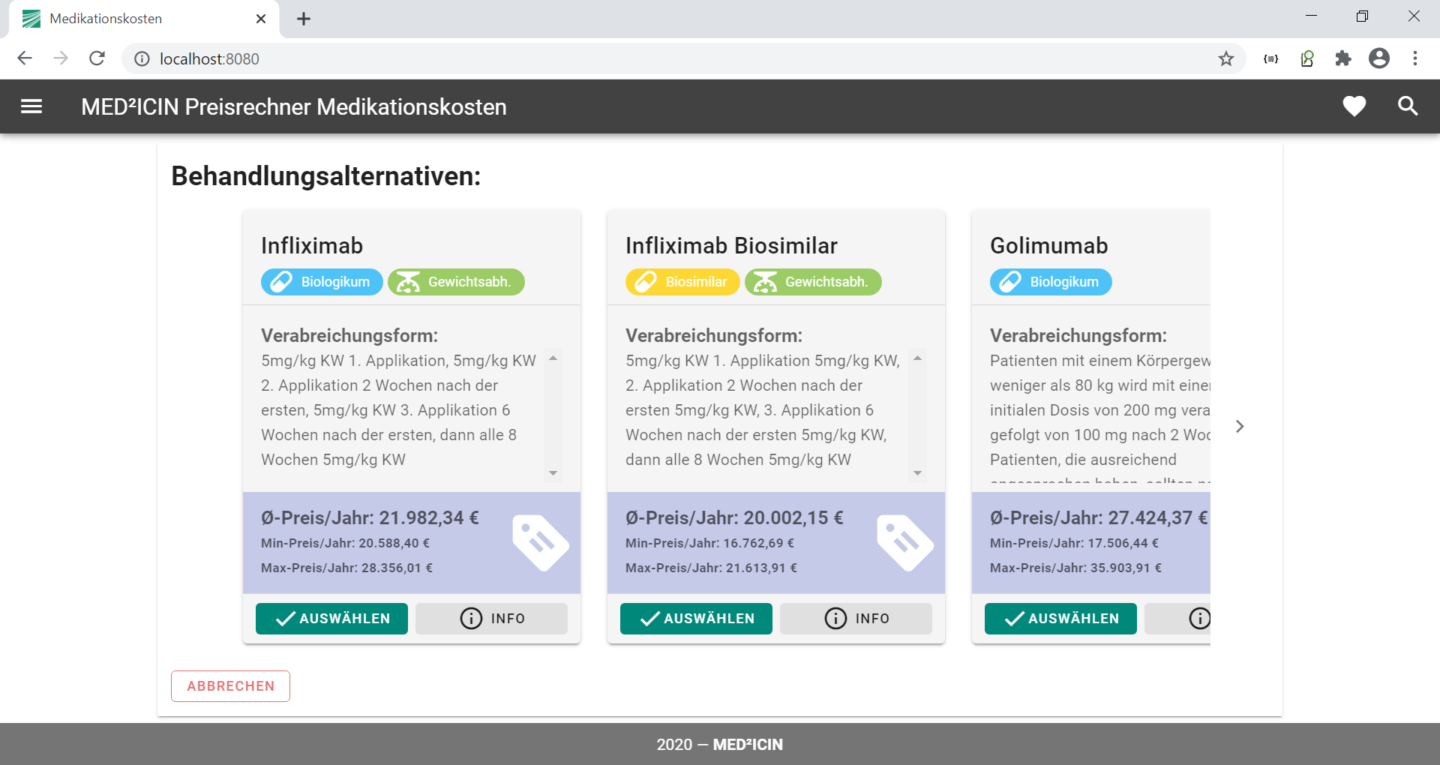
© Fraunhofer IMW
For many chronic diseases, medication costs account for a large proportion of the healthcare expenditure incurred. This is also true for inflammatory bowel disease (IBD). In the context of needs assessment, numerous physicians have expressed the wish for more cost transparency whilst retaining the same level of effectiveness. The Price Calculator for Medication Costs calculates the costs of various medications for the patient per quarter and year for original branded medications, generics (generic, chemically synthesized drugs) and biosimilars (imitation preparations of biopharmaceuticals) for medically equivalent therapies. The prices and approvals used are updated on an ongoing basis.
Guideline-based decision support
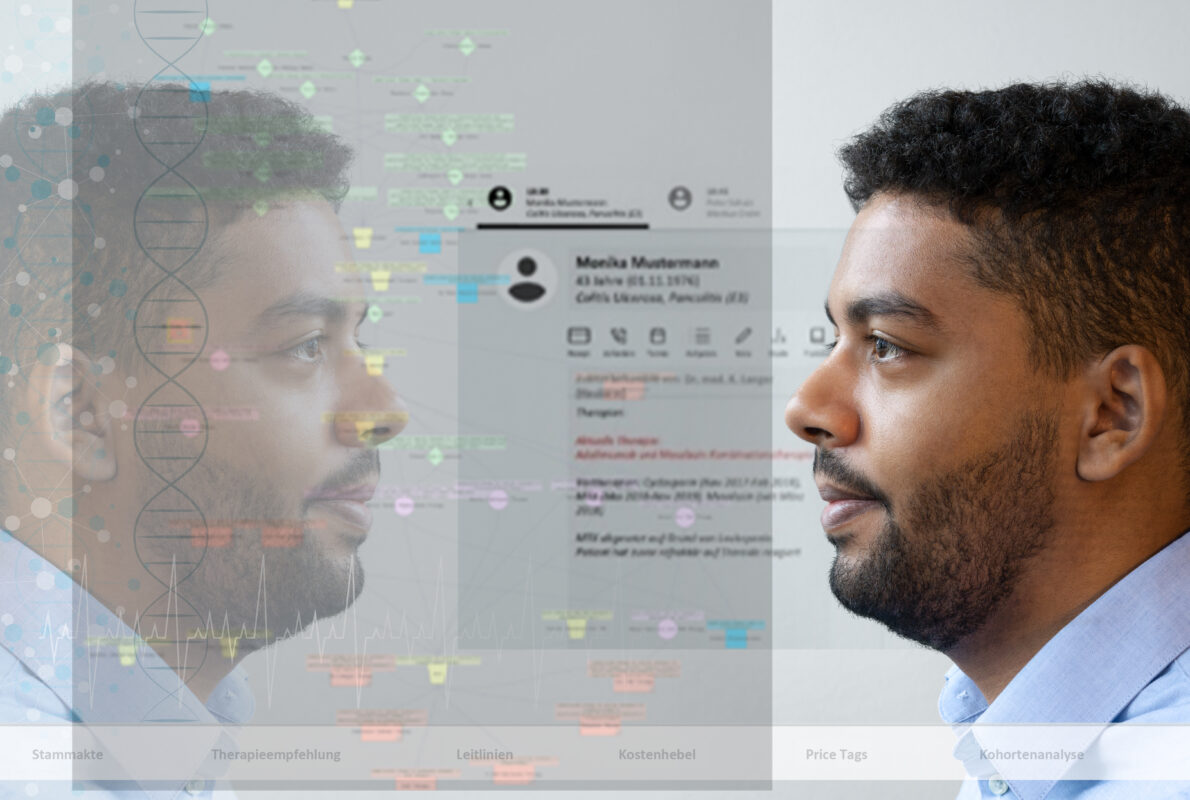
© Fraunhofer IOSB / Fraunhofer IME / Fotograf – Peter Granser
Clinical guidelines are developed by expert committees appointed by professional associations. They are characterized by a high level of expertise and clinical evidence, but their application in routine medical practice is very time-consuming due to the complex comparison of the current patient situation with the guideline parameters. In addition, they often do not reflect the current state of research. In the MED²ICIN project, therefore, guidelines have been modeled using the diagnosis and therapy of inflammatory bowel diseases and of selected oncological diseases as examples and converted into a computer-interpretable model. In this way, guideline recommendations can be automatically linked to the patient model, which was also developed in the lead project, in a decision support system. The model for guideline-based decision support can also be linked with data from current publications and studies.
Secure connectors: Medical Data Space

© Fraunhofer IOSB
Secure transmission of data also plays a major role in the MED²ICIN lead project, as various clinical partners and their data are connected to the system. In addition to the need for secure data transmission, medical data also raises special considerations regarding data protection. The technology of the Medical Data Space (MedDS) offers various solutions for this. In the framework of the MED²ICIN lead project, a MedDS is being set up to ensure secure data use in a distributed, decentralized system.
Patient app
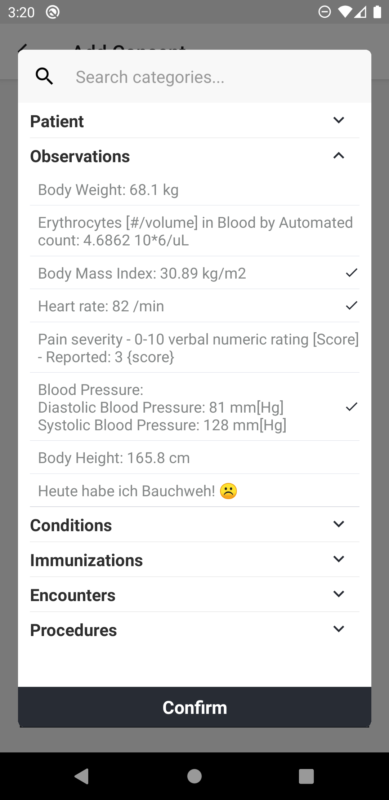
© Fraunhofer IOSB
The aim of the Fraunhofer lead project MED²ICIN is to develop an intelligent system for chronic inflammatory bowel diseases (IBD) and colorectal cancer that provides decision support functions for medical professionals. A fundamental component of the prototype is a patient app. In order to characterize disease activity, the physician usually obtains various items of patient information during the consultation – so called Patient-Reported Outcomes (PRO). For the physician, this means additional work in collecting patient data.
